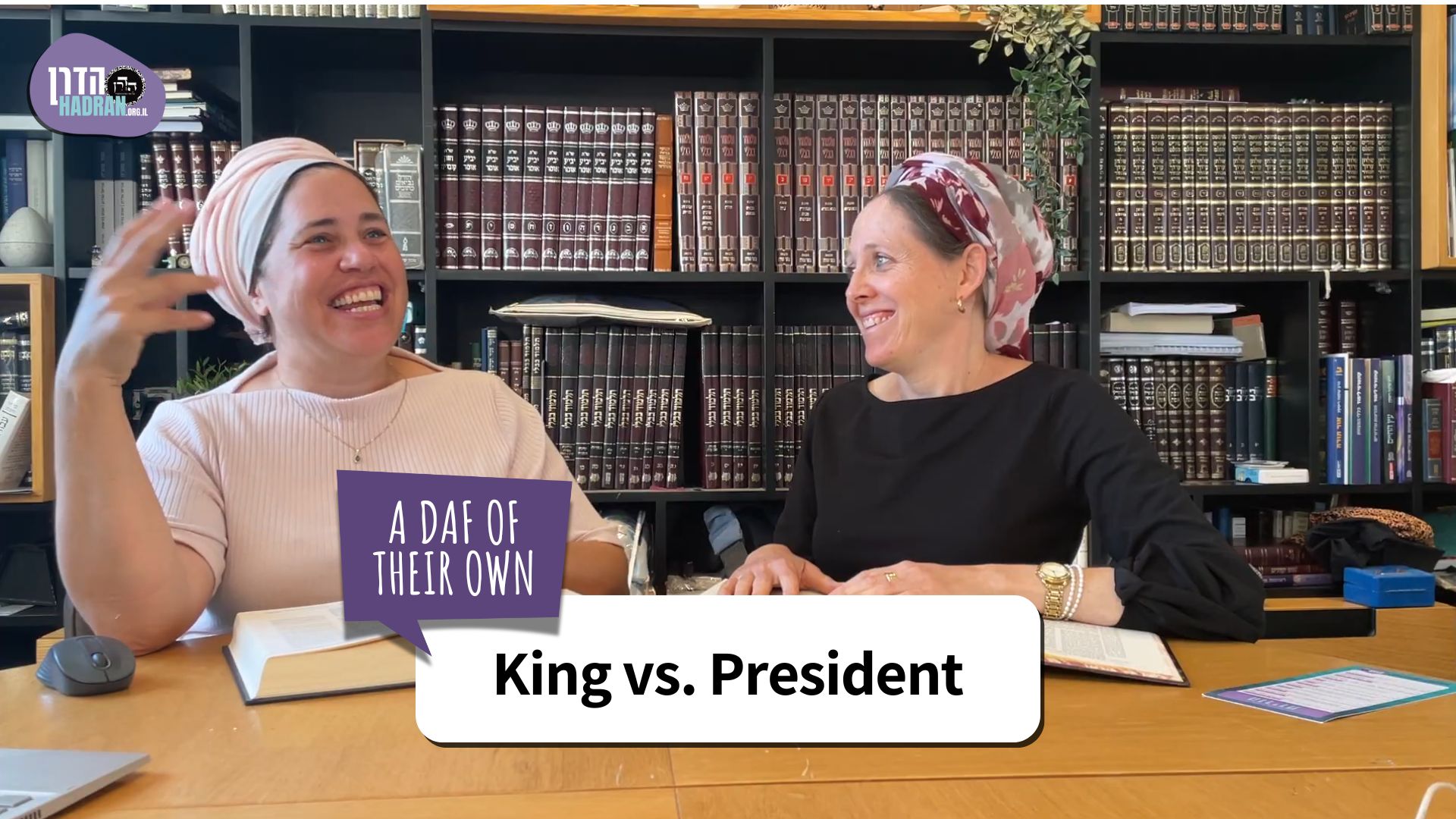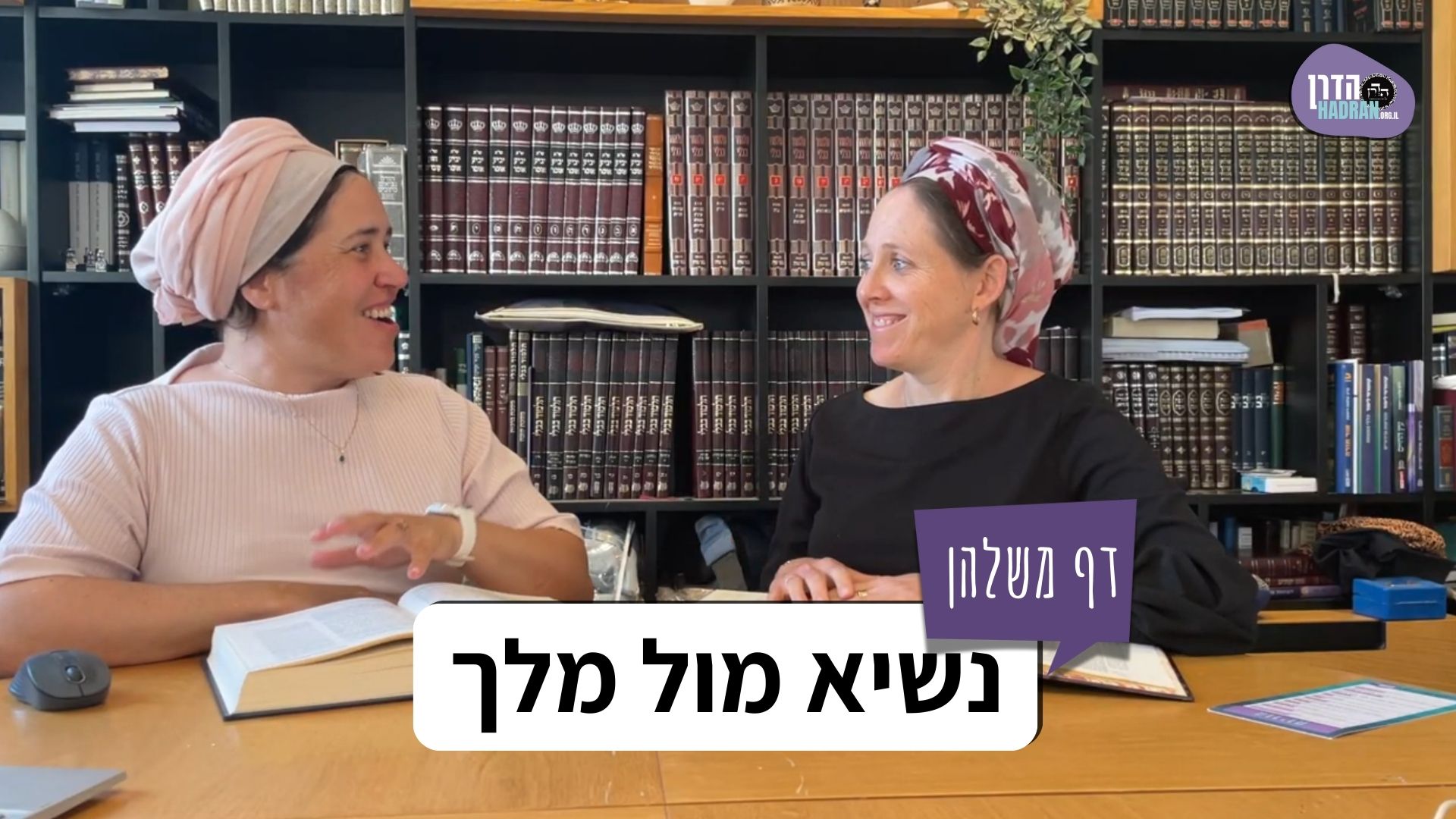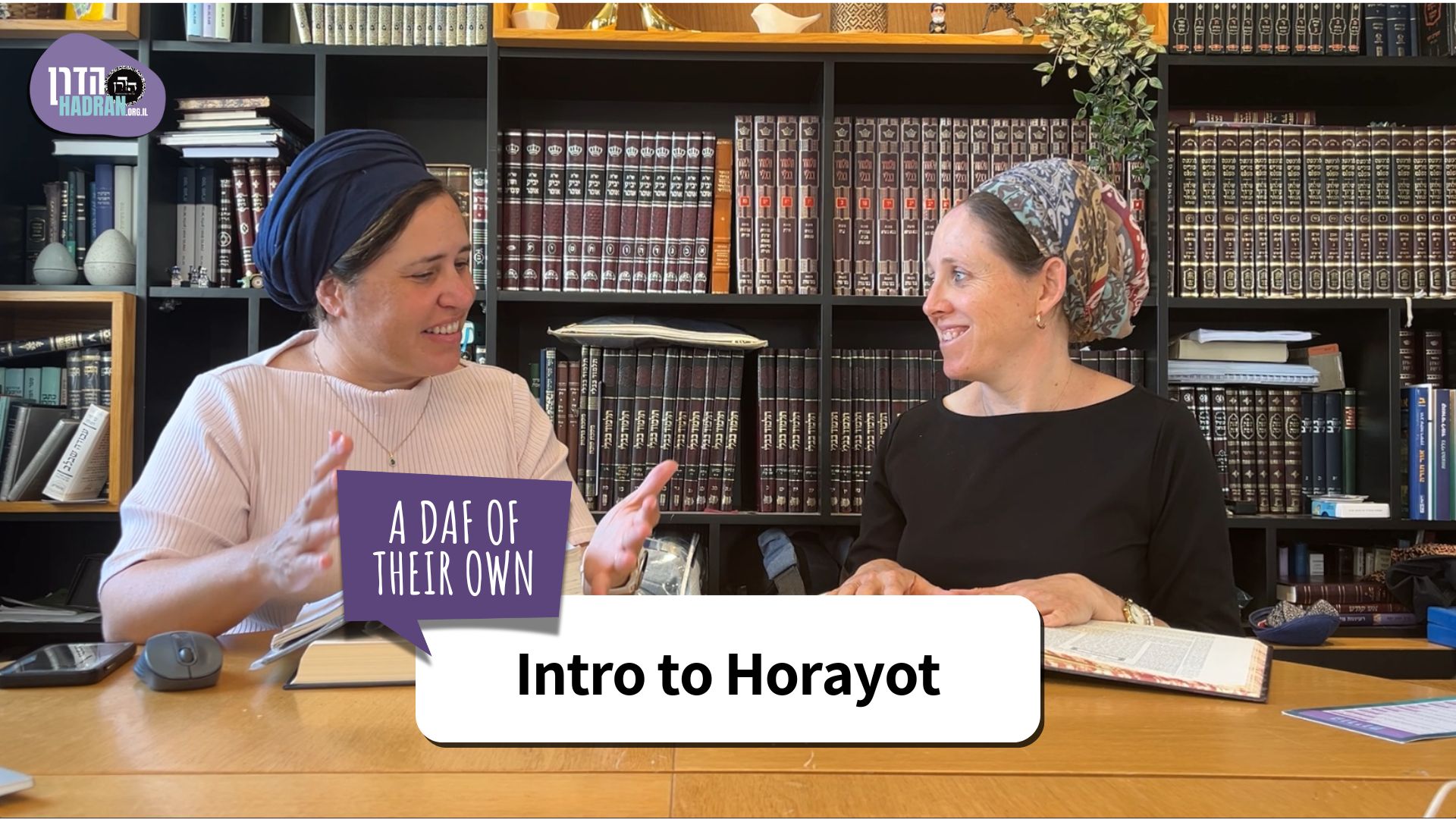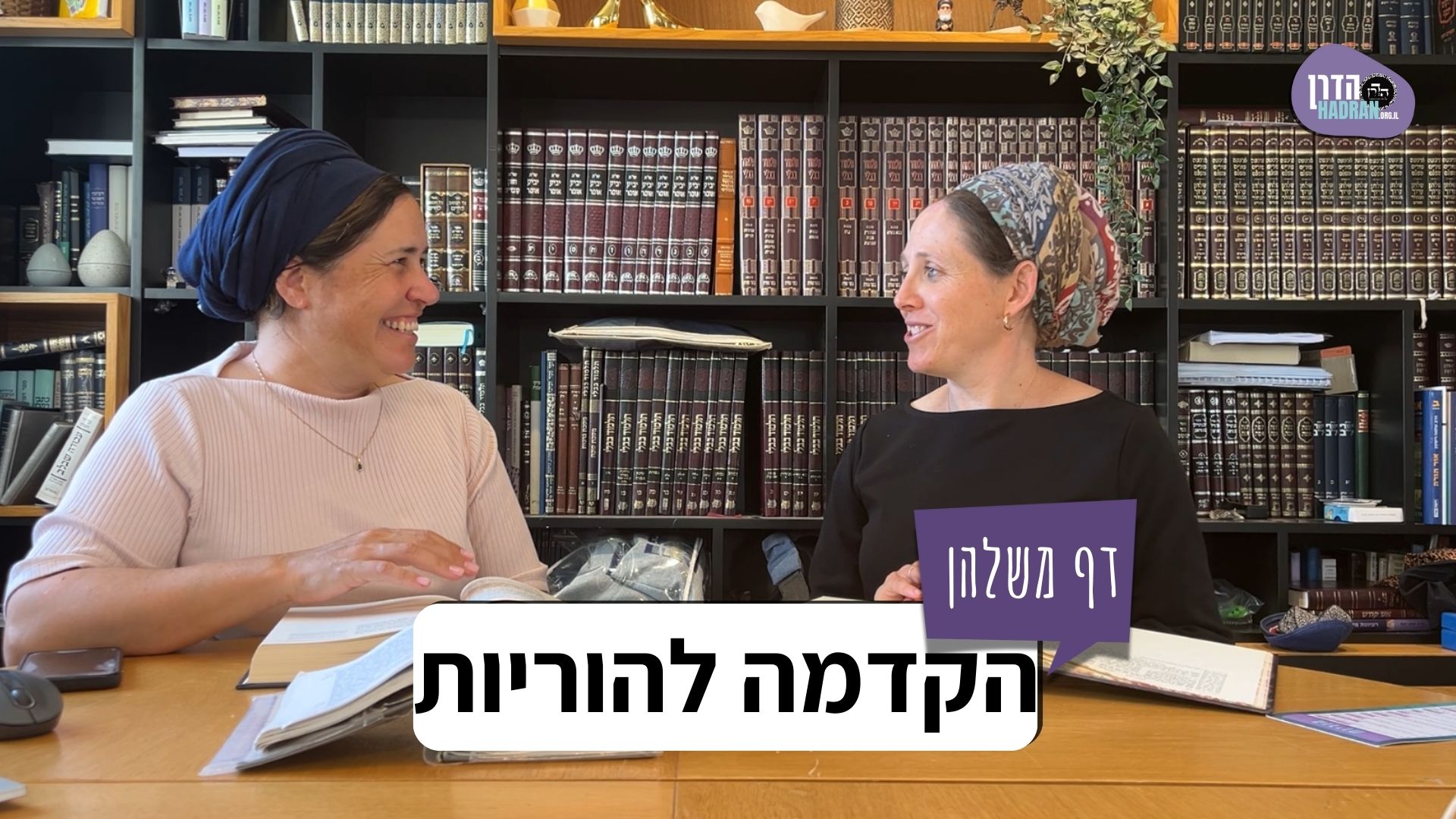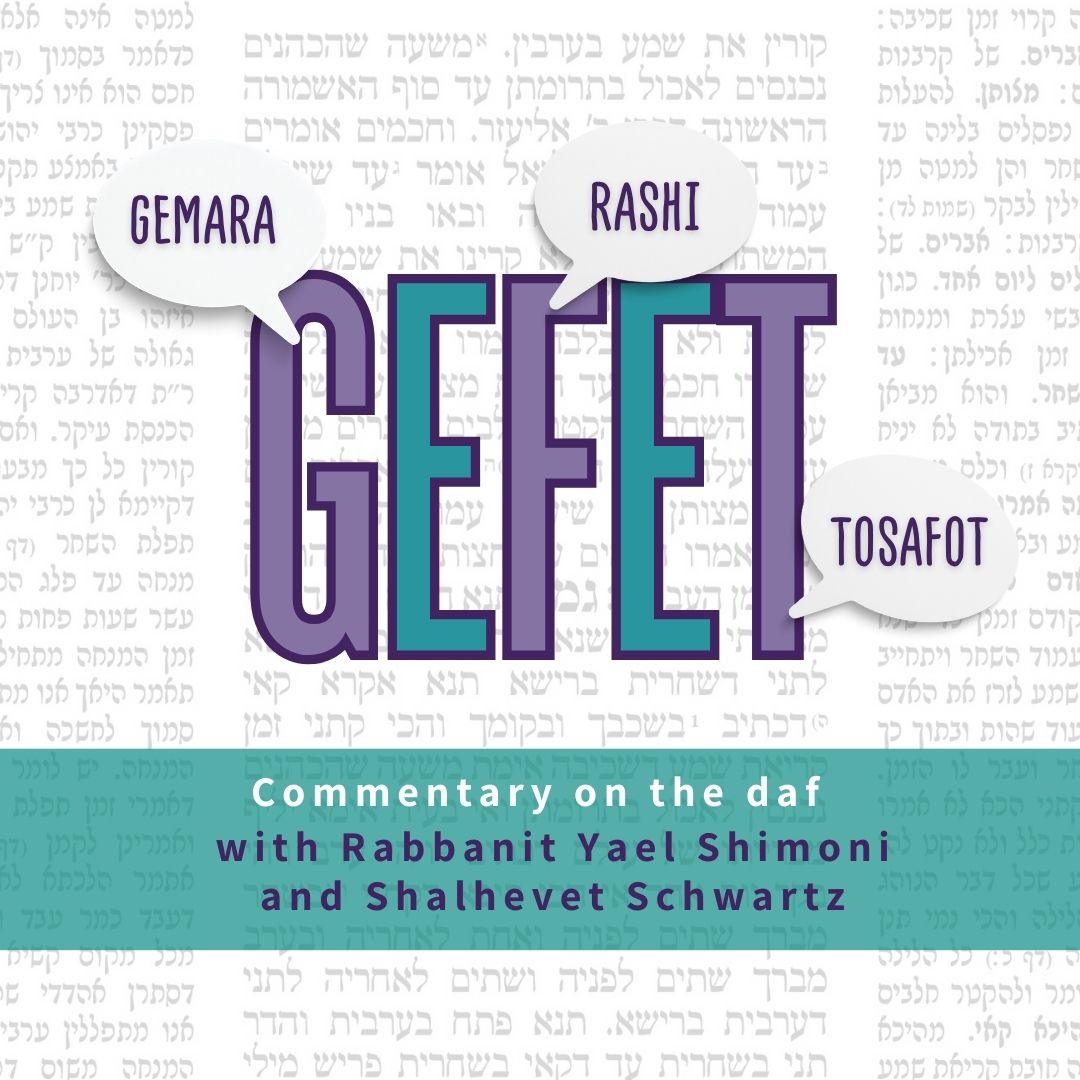Yevamot 28
לְכַתְּחִלָּה קָתָנֵי. וְלֵימָא לֵיהּ: גְּזֵירָה דִּלְמָא קְדֵים וַחֲלֵיץ לְרִאשׁוֹנָה בְּרֵישָׁא! ״וְלֹא מִתְיַיבְּמוֹת״ קָתָנֵי, דְּלֵיכָּא דִּין יִבּוּם הָכָא כְּלָל.
implies that the mishna teaches a case in which ḥalitza is performed ab initio. This indicates that this is the first course of action and the only way to resolve the situation. The Gemara asks further: And let him say to him the following: The mishna prohibits levirate marriage ab initio in this case, due to a rabbinic decree lest he proceed and perform the ḥalitza with the first sister first, whereby it would be prohibited to consummate the levirate marriage with the second. Perhaps for this reason the Sages decreed that it is prohibited to consummate the levirate marriage even if ḥalitza was performed with the second sister. The Gemara answers: It teaches: They may not enter into levirate marriage. This indicates that the halakha of levirate marriage does not apply here at all. Accordingly, even after the fact, if he performed ḥalitza with the second sister, the halakha of levirate marriage would not apply to the first sister.
וְלֵימָא לֵיהּ: גְּזֵירָה שֶׁמָּא יָמוּת, וְאָסוּר לְבַטֵּל מִצְוַת יְבָמִין! רַבִּי יוֹחָנָן לְמִיתָה לָא חָיֵישׁ.
The Gemara asks: And let him say to him a different reason for the ruling of the mishna: It is due to a rabbinic decree lest the second brother die, and it is prohibited to negate the mitzva of levirate marriage. Perhaps for this reason it would be forbidden to consummate the levirate marriage in the case where two sisters happened before him for levirate marriage, and not due to the prohibition proscribing the sister of a woman with whom he has a levirate bond. The Gemara answers: Rabbi Yoḥanan was not concerned over the possibility of the death of a brother, and in his opinion there is no need to make a decree to address such cases.
וְלֵימָא לֵיהּ: רַבִּי אֶלְעָזָר הִיא, דְּאָמַר: כֵּיוָן שֶׁעָמְדָה עָלָיו שָׁעָה אַחַת בְּאִיסּוּר — נֶאֶסְרָה עָלָיו עוֹלָמִית. מִדְּסֵיפָא רַבִּי אֶלְעָזָר, רֵישָׁא לָאו רַבִּי אֶלְעָזָר.
The Gemara asks: And let Rabbi Yoḥanan say to him that this mishna is in accordance with the opinion of Rabbi Elazar, who said: Once the yevama stood before him at one time as forbidden, even if it was not at the time that she happened before him, she remains forbidden to him forever. Perhaps the mishna could be explained according to Rabbi Elazar’s opinion. The Gemara answers: Since the opinion of Rabbi Elazar is cited explicitly in the latter clause of the mishna, it can be deduced that the first clause is not according to the opinion of Rabbi Elazar. Therefore, this ruling cannot be attributed to Rabbi Elazar.
וְנֵימָא לְהוּ: דִּנְפוּל בְּבַת אַחַת, וְרַבִּי יוֹסֵי הַגְּלִילִי הִיא, דְּאָמַר: אֶפְשָׁר לְצַמְצֵם! לָא סְתַם לַן תַּנָּא כְּרַבִּי יוֹסֵי הַגְּלִילִי.
The Gemara asks: And let him say to him that here the reference is to a situation where the two brothers died at once, and consequently both of the women happened before the yevamin for levirate marriage at the same time. And this mishna is in accordance with the opinion of Rabbi Yosei HaGelili, who says: It is possible to be precise. It is possible to determine that two events occurred at exactly the same moment, both sisters were forbidden at the time that they happened before the brothers-in-law. The Gemara answers: The tanna did not teach an unattributed mishna in accordance with the opinion of Rabbi Yosei HaGelili. Any time the mishna is cited in accordance with Rabbi Yosei HaGelili’s opinion, it is always attributed to him explicitly.
וְלֵימָא לֵיהּ: דְּלָא יָדְעִינַן הֵי נְפוּל בְּרֵישָׁא.
The Gemara asks: And let him say to him a different explanation for the ruling: This mishna is indeed addressing a case where the brothers died one after the other, yet we do not know which sister happened before the yevamin for levirate marriage first. In that case, it would be impossible to determine which sister would be permitted.
אִי הָכִי — הַיְינוּ דְּקָתָנֵי קָדְמוּ וְכָנְסוּ יוֹצִיאוּ? בִּשְׁלָמָא רִאשׁוֹנָה, אָמְרִינַן לֵיהּ: מַאן שְׁרָא לָךְ? אֶלָּא שְׁנִיָּה, אָמַר: חַבְרַאי שְׁנִיָּה יַיבֵּם, אֲנָא רִאשׁוֹנָה מְיַיבֵּם.
The Gemara answers: If so, that which the mishna teaches in the latter clause: And if they married their wives before consulting the court they should divorce them, is difficult. Why must they divorce their wives in this situation? Granted, the brother who took the first sister in levirate marriage must divorce her, as we say to him: Who permitted her to you? Indeed, she was forbidden as the sister of a woman with whom he had a levirate bond, and so he must divorce her. However, the brother who took the second sister could say: My fellow brother consummated the levirate marriage with the second sister, but I am consummating the levirate marriage with the first sister. It is possible that after the other brother consummated the levirate marriage with the second sister, the first sister would then be permitted to him after the fact, and he is not required to divorce her unless it is certain that he violated a prohibition.
הַיְינוּ דְּקָאָמַר לֵיהּ: אֲחָיוֹת אֵינִי יוֹדֵעַ מִי שְׁנָאָן.
The Gemara concludes: Indeed, this is what Rabbi Yoḥanan meant when he said to Rabbi Yosei bar Ḥanina: I do not know who taught: Sisters, for according to these considerations he cannot properly resolve the ruling of this mishna.
תְּנַן: הָיְתָה אַחַת מֵהֶן אֲסוּרָה עַל הָאֶחָד אִיסּוּר עֶרְוָה — אָסוּר בָּהּ וּמוּתָּר בַּאֲחוֹתָהּ, וְהַשֵּׁנִי אָסוּר בִּשְׁתֵּיהֶן. סָלְקָא דַּעְתָּךְ דִּנְפַלָה חֲמוֹתוֹ תְּחִלָּה.
We learned in the mishna: If one of the sisters was forbidden to one of the brothers due to a prohibition against forbidden relatives because she was a relative of his wife or a relative from his mother’s side, then he is prohibited from marrying her but permitted to marry her sister. But the second brother, who is not a close relative of either sister, is prohibited from marrying both of them. It enters your mind to say that a forbidden woman, such as his mother-in-law, happened before the yavam for levirate marriage first.
וְאַמַּאי? לֵיקוּ חָתָן לְיַיבֵּם הָךְ דְּאֵינָהּ חֲמוֹתוֹ בְּרֵישָׁא, וְתֶהֱוֵי חֲמוֹתוֹ לְגַבֵּי אִידַּךְ כִּיבָמָה שֶׁהוּתְּרָה וְנֶאֶסְרָה וְחָזְרָה וְהוּתְּרָה, תַּחְזוֹר לְהֶיתֵּרָהּ הָרִאשׁוֹן!
Accordingly, the Gemara asks: And why would both women be forbidden to the second brother? Let the son-in-law rise and consummate the levirate marriage with the sister who is not his mother-in-law first. Consequently, with regard to the other brother, his mother-in-law would be considered a yevama who was permitted to perform levirate marriage at the time that she happened before him, and then forbidden when her sister happened before him for levirate marriage as well, and then subsequently became permitted when his brother consummated the levirate marriage with her sister. If so, the mother-in-law should return to her original permitted status and may enter into levirate marriage with him.
אָמַר רַב פָּפָּא: כְּגוֹן דִּנְפַלָה הָךְ דְּאֵינָהּ חֲמוֹתוֹ בְּרֵישָׁא.
Rav Pappa said: The mishna is referring to a case where the woman who was not his mother-in-law happened before the brothers for levirate marriage first, in which case she was permitted to both of them. When her sister, i.e., the mother-in-law, happened before them for levirate marriage as well, both women were rendered forbidden to the second brother, as each one is the sister of a woman with whom he has a levirate bond. Because the mother-in-law was forbidden from the time that she happened before the yavam for levirate marriage, she can never be permitted to him.
רַבִּי אֱלִיעֶזֶר אוֹמֵר: בֵּית שַׁמַּאי אוֹמְרִים וְכוּ׳. תַּנְיָא, רַבִּי אֱלִיעֶזֶר אוֹמֵר, בֵּית שַׁמַּאי אוֹמְרִים: יְקַיְּימוּ, וּבֵית הִלֵּל אוֹמְרִים: יוֹצִיאוּ. רַבִּי שִׁמְעוֹן אוֹמֵר: יְקַיְּימוּ. אַבָּא שָׁאוּל אוֹמֵר: קַל הָיָה לָהֶם לְבֵית הִלֵּל בְּדָבָר זֶה, שֶׁבֵּית שַׁמַּאי אוֹמְרִים: יוֹצִיאוּ, וּבֵית הִלֵּל אוֹמְרִים: יְקַיְּימוּ.
§ With regard to the case of two brothers who married their wives before consulting the court, the mishna states that the women should be divorced. Rabbi Eliezer disagrees and says that this is a matter of dispute between Beit Shammai and Beit Hillel, as Beit Shammai say: They may maintain them as their wives, and Beit Hillel say: They should divorce them. An expanded version of this discussion is taught in the Tosefta (5:1): Rabbi Eliezer says that Beit Shammai say: They may maintain them as their wives, and Beit Hillel say: They should divorce them. Rabbi Shimon says: They may maintain them as their wives. Abba Shaul disagrees with Rabbi Eliezer and says: This was a matter of leniency for Beit Hillel. They were the ones who put forth a lenient ruling, as Beit Shammai say: They should divorce them, and Beit Hillel say: They may maintain them as their wives.
רַבִּי שִׁמְעוֹן כְּמַאן? אִי כְּבֵית שַׁמַּאי — הַיְינוּ רַבִּי אֱלִיעֶזֶר. אִי כְּבֵית הִלֵּל — הַיְינוּ אַבָּא שָׁאוּל! הָכִי קָאָמַר: לֹא נֶחְלְקוּ בֵּית שַׁמַּאי וּבֵית הִלֵּל בְּדָבָר זֶה.
The Gemara asks about this baraita: In accordance with whose opinion is the statement of Rabbi Shimon? This matter is a dispute between Beit Hillel and Beit Shammai, with different versions of their opinions, and therefore Rabbi Shimon should not have formulated the halakha in this manner. Indeed, if he holds in accordance with the opinion of Beit Shammai, then that is the same as the opinion of Rabbi Eliezer. He would thereby conclude that the halakha is in accordance with the opinion of Beit Shammai, as per Rabbi Eliezer’s version. If so, he should have formulated his opinion in that way. If, however, he holds in accordance with the opinion of Beit Hillel, then that is the opinion of Abba Shaul. The Gemara responds: This is what he is saying: Rabbi Shimon actually maintains a third opinion: Beit Shammai and Beit Hillel did not dispute this matter; both agreed that the marriages may be maintained.
הָיְתָה אַחַת מֵהֶם כּוּ׳. הָא תְּנֵינָא חֲדָא זִימְנָא: אֲחוֹתָהּ כְּשֶׁהִיא יְבִמְתָּהּ — אוֹ חוֹלֶצֶת אוֹ מִתְיַיבֶּמֶת!
§ The mishna stated: If one of the sisters was forbidden to one of the brothers due to a prohibition against forbidden relations, then he is prohibited from marrying her but permitted to marry her sister. The Gemara asks: We already learned this on one occasion: When her sister, who is a forbidden relative to the yavam, is her yevama as well, she either performs ḥalitza or enters into levirate marriage.
צְרִיכָא, דְּאִי אַשְׁמְועִינַן הָתָם: מִשּׁוּם דְּלֵיכָּא לְמִיגְזַר מִשּׁוּם שֵׁנִי, אֲבָל הָכָא, דְּאִיכָּא לְמִיגְזַר מִשּׁוּם שֵׁנִי — אֵימָא לָא.
The Gemara answers: It is necessary that this be said here as well, for if it taught us this halakha only there in its more general formulation (Yevamot 20a), then I might have said: The yavam is permitted to marry the sister because there is no reason to issue a rabbinic decree due to a second brother. There, there is only one yavam, to whom one sister is permitted and the other is forbidden. Here, however, in the case of two brothers, where there is reason to issue a rabbinic decree due to the second brother, lest he consummate the levirate marriage as well, I would say that we do not allow even the first brother to perform levirate marriage, and both sisters-in-law should be forbidden to both brothers.
וְאִי אַשְׁמוּעִינַן הָכָא: מִשּׁוּם דְּאִיכָּא שֵׁנִי דְּקָא מוֹכַח, אֲבָל הָתָם, דְּלֵיכָּא שֵׁנִי — אֵימָא לָא. צְרִיכָא.
And if the mishna had taught us the halakha only here, it would have been possible to say that the permissibility of levirate marriage here is because there is a second brother who indicates, by refraining from performing levirate marriage, that the sister of a woman bound by a levirate bond is forbidden. However, there, where there is not a second brother, I would say no, this halakha would not apply, due to a concern that people might wrongly conclude that the sister of a woman bound by a levirate bond is permitted. Therefore, it is necessary to state this halakha in both places.
אִיסּוּר מִצְוָה כּוּ׳. הָא נָמֵי תְּנֵינָא:
It was taught in the mishna: If one of the sisters was forbidden to one of the brothers due to a prohibition resulting from a mitzva or due to a prohibition stemming from sanctity, then her sister must perform ḥalitza and may not enter into levirate marriage. The Gemara wonders: We already learned this as well:
אִיסּוּר מִצְוָה וְאִיסּוּר קְדוּשָּׁה — חוֹלֶצֶת וְלֹא מִתְיַיבֶּמֶת! הָתָם, אִיסּוּר מִצְוָה לְחוֹדַהּ, הָכָא, אִיסּוּר מִצְוָה, וַאֲחוֹתָהּ.
If a prohibition resulting from a mitzva or a prohibition stemming from sanctity will be transgressed through the levirate marriage, then the woman must perform ḥalitza and she may not enter into levirate marriage. The Gemara answers: There is a novelty here: There, where the halakha is reviewed in general terms, it speaks of a prohibition due to a mitzva alone. One woman happened before the yavam for levirate marriage and it is only as a result of this prohibition that she is prevented from entering levirate marriage. Here, there is a prohibition resulting from a mitzva and, in addition, her sister happened before the yevamin for levirate marriage together with her.
סָלְקָא דַּעְתָּךְ אָמֵינָא: לֵיקוּם אִיסּוּר מִצְוָה בִּמְקוֹם אִיסּוּר עֶרְוָה — וְתִתְיַיבֵּם, קָא מַשְׁמַע לַן.
It might enter your mind to say: Let the prohibition resulting from a mitzva stand in the same place, i.e., level of severity, as the prohibition against forbidden relatives. Consequently, the woman who is forbidden to the yavam is considered a forbidden relative and her sister is permitted to him. Despite the fact that the prohibition resulting from a mitzva is not as severe, here it is given equal status, and we might say: Let her sister enter into levirate marriage. Therefore, this comes to teach us that this is not the case.
וְתִתְיַיבֵּם? כֵּיוָן דְּמִדְּאוֹרָיְיתָא רַמְיָא קַמֵּיהּ, קָא פָגַע בַּאֲחוֹת זְקוּקָתוֹ. סָלְקָא דַּעְתָּךְ אָמֵינָא: מִשּׁוּם מִצְוָה עֲבוּד רַבָּנַן, קָא מַשְׁמַע לַן.
The Gemara asks: And why in fact does her sister not enter into levirate marriage? The Gemara answers: Her sister is forbidden to him because by Torah law the prohibited woman is still set before the yavam for levirate marriage. Were he to take the sister in levirate marriage he would essentially be encountering the sister of the woman with whom he has a levirate bond. It might enter your mind to say that due to the mitzva of levirate marriage, the Sages did as they did and nullified their decree prohibiting the sister of a woman with whom the yavam has a levirate bond from entering levirate marriage, when the original sister is forbidden only as the result of a mitzva. Therefore, it teaches us that they did not cancel their decree in this situation.
הָיְתָה אַחַת מֵהֶן כּוּ׳. הָא תּוּ לְמָה לִי, הַיְינוּ הָךְ: מָה לִי לְחַד מָה לִי לִתְרֵי?!
It was taught in the mishna: If one of those women was forbidden to this one brother due to a prohibition against forbidden relatives and the second was forbidden to that second brother due to a prohibition against forbidden relatives, then she who is forbidden to this brother is permitted to that brother, and she who is forbidden to that brother is permitted to this one. The Gemara asks: Why do I need this halakha as well, for this is identical to that which was taught earlier, when the mishna stated that if one of the sisters was forbidden to one of the brothers due to a prohibition against forbidden relatives, then he is forbidden to marry her but permitted to marry her sister. However, the second brother, who is not a close relative of either sister, is prohibited from marrying both of them. Once the mishna taught that the yavam is permitted to marry the woman to whom he is not related, what is the difference to me if there is one brother or two brothers? If this happened to both brothers, clearly both should be allowed.
צְרִיכָא: דְּאִי אַשְׁמְועִינַן הָתָם, מִשּׁוּם דְּאִיכָּא שֵׁנִי דְּמוֹכַח, אֲבָל הָכָא, דְּלֵיכָּא שֵׁנִי דְּקָא מוֹכַח, אֵימָא לָא.
The Gemara answers: It is necessary to state this, for if it taught us the halakha only there, in the case where only one brother is permitted, one might have said: This is because there is a second brother who indicates that the sister of a woman bound by a levirate bond is forbidden to him by refraining from levirate marriage with her. However, here, where there is not a second brother who indicates this, as both brothers are performing levirate marriage, then I would say no; this halakha would not apply, due to the concern that people might wrongly conclude that the sister of a woman with whom the yavam has a levirate bond is permitted even in cases where the other woman is not a forbidden relative.
וְאִי אַשְׁמְועִינַן הָכָא: אַדְּרַבָּה, תַּרְוַויְיהוּ מוֹכְחִי אַהֲדָדֵי, אֲבָל אִידַּךְ — לָא, צְרִיכָא.
And the opposite could also be said: If it taught us the ruling only here, in the case of two brothers, one might have said: On the contrary, they both indicate the nature of each other’s status. Each of the brothers married a specific sister-in-law, i.e., the woman who was not his close relative, indicating he does not have a levirate bond with the other sister. But in the other case, where one brother is allowed to consummate the levirate marriage and the second brother is forbidden to both sisters, I might say that no, we would not allow marriage to the first brother either. Therefore, it is necessary to state the halakha in both instances.
זוֹ הִיא שֶׁאָמְרוּ וְכוּ׳. ״זוֹ הִיא״ לְמַעוֹטֵי מַאי? לְמַעוֹטֵי אִיסּוּר מִצְוָה לָזֶה וְאִיסּוּר מִצְוָה לָזֶה.
It was taught in the mishna: And this is the case that was referred to when they said: When her sister is also her yevama, she either performs ḥalitza or enters into levirate marriage. The Gemara asks: What does the expression: This is, come to exclude? The Gemara answers: It excludes the case where there is a prohibition resulting from a mitzva for this one and a prohibition resulting from a mitzva for that one. Although each woman is forbidden to a different brother due to a prohibition resulting from a mitzva, they may not both enter into levirate marriage.
הָא תּוּ לְמָה לִי, הַיְינוּ הָךְ: מָה לִי לְחַד, מָה לִי לִתְרֵי?!
The Gemara asks: Why do I need this as well? This is identical to that which was taught previously, that if one of the sisters was forbidden to the yavam due to a prohibition resulting from a mitzva, then he is not permitted to consummate the levirate marriage with either of them. What difference is there to me if she happened before one brother or two?
מַהוּ דְּתֵימָא: כִּי לָא אָמְרִינַן אוֹקֵי אִיסּוּר מִצְוָה בִּמְקוֹם אִיסּוּר עֶרְוָה — הֵיכָא דְּאִיכָּא לְמִיגְזַר מִשּׁוּם שֵׁנִי, אֲבָל הֵיכָא דְּלֵיכָּא לְמִיגְזַר מִשּׁוּם שֵׁנִי, אֵימָא: לְהַאי אוֹקֵימְנָא אִיסּוּר מִצְוָה בִּמְקוֹם אִיסּוּר עֶרְוָה, וּלְהַאי [אוֹקֵימְנָא] אִיסּוּר מִצְוָה בִּמְקוֹם אִיסּוּר עֶרְוָה, וְלִיַּיבְּמוּ, קָא מַשְׁמַע לַן.
The Gemara answers: Lest you say: There is only one instance when we do not say: Let the prohibition resulting from a mitzva stand in the same place, i.e., level of severity, as a prohibition against forbidden relatives. It occurs in a case where it is appropriate to issue a rabbinic decree due to the second brother, who is prohibited from marrying both sisters. But in a case where it is not appropriate to issue a rabbinic decree due to the second brother, as the second sister is permitted to the second brother as well, I might say: For this brother, let us stand the prohibition resulting from a mitzva in the same place as a prohibition against forbidden relatives, and for this brother let us stand the prohibition resulting from a mitzva in the same place as a prohibition against forbidden relatives, and as a result both brothers may consummate the levirate marriage. Therefore, it teaches us that this is not so.
אָמַר רַב יְהוּדָה אָמַר רַב, וְכֵן תָּנֵי רַבִּי חִיָּיא: בְּכוּלָּן אֲנִי קוֹרֵא בָּהֶן, הָאֲסוּרָה לָזֶה מוּתֶּרֶת לָזֶה, וַאֲחוֹתָהּ כְּשֶׁהִיא יְבִמְתָּהּ — אוֹ חוֹלֶצֶת אוֹ מִתְיַיבֶּמֶת.
§ Incidental to this halakha, the Gemara cites the following statement: Rav Yehuda said that Rav said, and similarly Rabbi Ḥiyya teaches in a baraita: With regard to all of those women enumerated in the first mishna of the tractate, who are forbidden to the yevamin as forbidden relatives, the following situation could arise: These women could also be two sisters who were married to two brothers who happen before their yevamin for levirate marriage while each one is a forbidden relative to one of the yevamin. In these situations, I could apply the ruling that she who is forbidden to this brother is permitted to that brother, as well as the ruling that when her sister is also her yevama she may either perform ḥalitza or enter into levirate marriage.
וְרַב יְהוּדָה מְתַרְגֵּם מֵחֲמוֹתוֹ וְאֵילָךְ, אֲבָל שִׁיתָּא בָּבֵי דְרֵישָׁא — לָא.
But Rav Yehuda interprets these principles as applying only to those cases found in the list from the mother-in-law of the yavam and onward, but not to the six cases at the beginning, which include his daughter, and his wife’s daughter, and their descendants.
מַאי טַעְמָא — כֵּיוָן דְּבִתּוֹ בְּאוּנְסִין הוּא דְּמַשְׁכַּחַתְּ לַהּ, בְּנִשּׂוּאִין לָא מַשְׁכַּחַתְּ לַהּ.
What is the reason for Rav Yehuda’s distinction? This is because you find the scenario where two women who are candidates for levirate marriage are both sisters as well as the daughters of the two yevamin only in a case where the women are the daughters of the yevamin through rape, but you cannot find it in a case where they are his daughters through marriage. If one brother married a woman and had a daughter with her, then this woman, the wife of a brother who has children, is forbidden to all of his brothers. Therefore, it would be impossible for another brother to have a daughter with that same woman, and therefore the two daughters could never be sisters. The scenario of daughters who are also sisters is possible only when the first brother raped a woman and gave birth to a daughter, such that the woman is not forbidden to his brothers. If one of the brothers then had a daughter with this woman and both daughters married other brothers who then died, it is possible that these daughters would happen before their fathers for levirate marriage.
בְּנִשּׂוּאִין קָמַיְירֵי, בְּאוּנְסִין לָא קָא מַיְירֵי.
Rav Yehuda maintains that the current mishna deals with cases of marriage but does not deal with cases of rape, and therefore he does not apply the principles governing sisters to those cases.
וְאַבָּיֵי מְתַרְגֵּם אַף בִּתּוֹ (בָּאָה) מֵאֲנוּסָתוֹ, כֵּיוָן דְּאַשְׁכּוֹחֵי מַשְׁכַּחַתְּ לַהּ, אִי בָּעֲיָא — בְּאוּנְסִין תֶּיהְוֵי, אִי בָּעֲיָא — בְּנִשּׂוּאִין תִּהְוֵי. אֲבָל אֵשֶׁת אָחִיו שֶׁלֹּא הָיָה בְּעוֹלָמוֹ — לָא. כֵּיוָן דְּאַלִּיבָּא דְּרַבִּי שִׁמְעוֹן הוּא דְּמַשְׁכַּחַתְּ לַהּ, אַלִּיבָּא דְּרַבָּנַן לָא מַשְׁכַּחַתְּ לַהּ — בִּפְלוּגְתָּא לָא קָמַיְירֵי.
And Abaye interprets these principles as applying even to his daughter from a woman he raped. Since you can find this scenario, if the statement wants to deal with cases of rape, let it; if it wants to deal with cases of marriage, let it. It is preferable to explain this matter with regard to cases of marriage, but if that is not possible, it can still be explained as dealing with cases of rape. However, it cannot be explained as referring to the wife of a brother with whom he did not coexist. Even according to the opinion of Abaye, this case cannot be included, since you can find a situation where two sisters happen before two brothers for levirate marriage while each woman is the wife of a brother with whom he did not coexist only according to the opinion of Rabbi Shimon, while such a case cannot be found according to the opinion of the Rabbis. And Rabbi Ḥiyya does not deal with cases that are subject to dispute.
וְרַב סָפְרָא מְתַרְגֵּם אַף אֵשֶׁת אָחִיו שֶׁלֹּא הָיָה בְּעוֹלָמוֹ, וּמַשְׁכַּחַתְּ לַהּ בְּשִׁיתָּא אַחֵי וְאַלִּיבָּא דְּרַבִּי שִׁמְעוֹן. וְסִימָנָיךְ: מֵת נוֹלַד וְיִיבֵּם, מֵת נוֹלַד וְיִיבֵּם.
And Rav Safra interprets these principles as applying to the wife of a brother with whom he did not coexist, and you can find this scenario in the case of the six brothers and according to the opinion of Rabbi Shimon. And your mnemonic to remember how this might come about is as follows: Died, born, consummated the levirate marriage; died, born, consummated the levirate marriage.
רְאוּבֵן וְשִׁמְעוֹן נְשׂוּאִין שְׁתֵּי אֲחָיוֹת, לֵוִי וִיהוּדָה נְשׂוּאִין שְׁתֵּי נׇכְרִיּוֹת. מֵת רְאוּבֵן, נוֹלַד יִשָּׂשכָר, וְיִיבֵּם לֵוִי. מֵת שִׁמְעוֹן, נוֹלַד זְבוּלֻן, וְיִיבֵּם יְהוּדָה. מֵתוּ לֵוִי וִיהוּדָה בְּלֹא בָּנִים, וְנָפְלוּ לְהוּ קַמֵּי יִשָּׂשכָר וּזְבוּלֻן.
How could this come about? There were two brothers, Reuven and Shimon, who were married to two sisters. And there were two other brothers, Levi and Yehuda, who were married to two unrelated women. Reuven died, Yissakhar was born, and Levi consummated the levirate marriage with Reuven’s wife. Afterward, Shimon died, Zevulun was born, and Yehuda consummated the levirate marriage with Shimon’s wife. Later, Levi and Yehuda died childless and these two sisters happened before Yissakhar and Zevulun for levirate marriage.
הָאֲסוּרָה לָזֶה — מוּתֶּרֶת לָזֶה. וְהָאֲסוּרָה לָזֶה — מוּתֶּרֶת לָזֶה. וַאֲחוֹתָהּ שֶׁהִיא יְבִמְתָּהּ.
In this scenario, the woman who had been Reuven’s wife is forbidden to this brother, Yissakhar, as the wife of a brother with whom he did not coexist, because he was not alive at the same time as Reuven, and yet she is nevertheless permitted to this brother, Zevulun, because when Zevulun was born this woman was already the wife of Levi, a brother with whom he did coexist. According to Rabbi Shimon, the fact that she had previously been the wife of Reuven, a brother with whom he did not coexist, is not taken into account. Similarly, with regard to Shimon’s wife, we find that she who is forbidden to this one is permitted to that one. Shimon’s wife is forbidden to Zevulun as the wife of a brother with whom he did not coexist, but she is nevertheless permitted to Yissakhar. Accordingly, the situation of her sister who is her yevama, i.e., two sisters who are yevamot and yet are allowed to perform levirate marriage, can be applied to this case as well.
לְמָה לִי יִיבֵּם יְהוּדָה? בְּלָא יִיבֵּם יְהוּדָה נָמֵי מַשְׁכַּחַתְּ לַהּ!
The Gemara asks: Why do I need to assume that this is referring to a scenario where Yehuda consummated the levirate marriage? You can find this possibility in a case where Yehuda did not consummate the levirate marriage as well. This scenario can also take place with only five brothers and without Yehuda: Reuven and Shimon were married to two sisters, Reuven died, Yissakhar was born, and Levi consummated the levirate marriage with Reuven’s wife. Then Shimon died and Zevulun was born. If Levi then dies, Levi’s wife is forbidden to Yissakhar as the wife of his brother Reuven, with whom he did not coexist, but she would be permitted to Zevulun because she was already the wife of Levi when Zevulun was born. Shimon’s wife would be forbidden to Zevulun but permitted to Yissakhar.
מִשּׁוּם צָרָה. הָא תִּינַח צָרָה, צָרָה דְצָרָה מַאי אִיכָּא לְמֵימַר?
The Gemara responds: This is due to the rival wife. It was taught in this way in order to make the principle applicable not only to the wives, but also to their rival wives. In this scenario, Levi and Yehuda were previously married to two sisters who then became the rival wives of a wife of a brother with whom one did not coexist. This allows the ruling to apply to the case of rival wives as well. The Gemara notes: This works out well if the mishna comes to include only a rival wife herself, but what can be said about the rival wife of a rival wife? How can this case explained? If one aims to include all of the details of the mishna in Rabbi Ḥiyya’s principle, then the mishna must be referring not only to a case involving the brothers’ rival wives, but also to the rival wives of those rival wives mentioned in the mishna.
כְּגוֹן דַּהֲדַר וְיַבְּמִינְהוּ נָמֵי גָּד וְאָשֵׁר.
The Gemara answers: Therefore, one must include a case where Gad and Asher subsequently consummated the levirate marriage with these women as well. That is, initially there were two other brothers, Gad and Asher, who consummated the levirate marriage with the previous wives of Levi and Yehuda, each of whom had taken one of the wives of Reuven and Shimon. Later, when Gad and Asher died, their previous wives, who are the rival wives of the rival wives of Reuven and Shimon’s wives, happen before Yissakhar and Zevulun for levirate marriage.
מַתְנִי׳ שְׁלֹשָׁה אַחִין, שְׁנַיִם מֵהֶן נְשׂוּאִין שְׁתֵּי אֲחָיוֹת, אוֹ אִשָּׁה וּבִתָּהּ, אוֹ אִשָּׁה וּבַת בִּתָּהּ, אוֹ אִשָּׁה וּבַת בְּנָהּ — הֲרֵי אֵלּוּ חוֹלְצוֹת וְלֹא מִתְיַיבְּמוֹת. וְרַבִּי שִׁמְעוֹן פּוֹטֵר.
MISHNA: In the case of three brothers, two of whom were married to close relatives, e.g., two sisters; or a woman and her daughter; or a woman and her daughter’s daughter; or a woman and her son’s daughter, if the two brothers who were married to two close relatives died and their wives happened before a third brother for levirate marriage, then these two women must perform ḥalitza and may not enter into levirate marriage, as each of them is a relative of a woman with whom he has a levirate bond. And Rabbi Shimon exempts them even from the obligation to perform ḥalitza.
הָיְתָה אַחַת מֵהֶן אֲסוּרָה עָלָיו אִיסּוּר עֶרְוָה — אָסוּר בָּהּ, וּמוּתָּר בַּאֲחוֹתָהּ. אִיסּוּר מִצְוָה אוֹ אִיסּוּר קְדוּשָּׁה — חוֹלְצוֹת וְלֹא מִתְיַיבְּמוֹת.
If one of them was forbidden to him, the third brother, due to a prohibition against forbidden relatives, then he is prohibited from marrying her but is permitted to marry her sister. Because the woman who is forbidden to him is not considered to be a woman who requires him for levirate marriage, there is only one woman who happens before him for levirate marriage. However, if one of the women was forbidden due to a prohibition resulting from a mitzva or a prohibition stemming from sanctity, then they must perform ḥalitza and may not enter into levirate marriage. This is because these prohibitions do not completely cancel the levirate bond.
גְּמָ׳ תַּנְיָא: רַבִּי שִׁמְעוֹן פּוֹטֵר בִּשְׁתֵּיהֶן מִן הַחֲלִיצָה וּמִן הַיִּיבּוּם, שֶׁנֶּאֱמַר: ״וְאִשָּׁה אֶל אֲחוֹתָהּ לֹא תִקָּח לִצְרוֹר״. בְּשָׁעָה שֶׁנַּעֲשׂוּ צָרוֹת זוֹ לָזוֹ — לֹא יְהֵא לְךָ לִיקּוּחִין אֲפִילּוּ בְּאַחַת מֵהֶן.
GEMARA: It is taught in a baraita: Rabbi Shimon exempts both of them from ḥalitza and from levirate marriage, as it is stated: “And you shall not take a woman to her sister, to be a rival to her” (Leviticus 18:18). This indicates that at the time that a situation arises wherein they are to become rival wives to each other, e.g., two sisters happen before one yavam for levirate marriage, you shall not have the ability to take even one of them in marriage. In his opinion, both women are exempt from both levirate marriage and ḥalitza at the moment that they happen before the yavam, just as a forbidden relative is exempt from both levirate marriage and ḥalitza.
הָיְתָה אַחַת מֵהֶן כּוּ׳. הָא תּוּ לְמָה לִי, הַיְינוּ הָךְ!
It was taught in the mishna: If one of them was forbidden to him due to a prohibition against forbidden relatives, he is prohibited from marrying her but is permitted to marry her sister. The Gemara asks: Why do I need this statement as well? This is identical to that which was taught in the previous mishna.
לְרַבִּי שִׁמְעוֹן אִיצְטְרִיךְ, סָלְקָא דַּעְתָּךְ אָמֵינָא: הוֹאִיל וְאָמַר רַבִּי שִׁמְעוֹן שְׁתֵּי אֲחָיוֹת לֹא חוֹלְצוֹת וְלֹא מִתְיַיבְּמוֹת, לִגְזוֹר מִשּׁוּם שְׁתֵּי אֲחָיוֹת דְּעָלְמָא, קָמַשְׁמַע לַן.
The Gemara answers: It was necessary to state this again here according to the opinion of Rabbi Shimon. It might enter your mind to say: Since Rabbi Shimon said that two sisters may not perform ḥalitza and may not enter into levirate marriage, as the very fact that they require levirate marriage from the same man and stand to become rival wives to each other renders them forbidden, we should issue a rabbinic decree in this case as well. Although in this case only one of the sisters is eligible for levirate marriage, as the other is a forbidden relative, perhaps there should be a rabbinic decree prohibiting the yavam from marrying the permitted sister, due to the similarity to the case of two sisters in general who happen before him for levirate marriage. This teaches us that even Rabbi Shimon does not hold that there is a rabbinic decree in this case.
אִיסּוּר מִצְוָה כּוּ׳.
It was taught in the mishna that if the wives are forbidden to the yavam due to a prohibition resulting from a mitzva or sanctity, they must perform ḥalitza and may not enter into levirate marriage.







